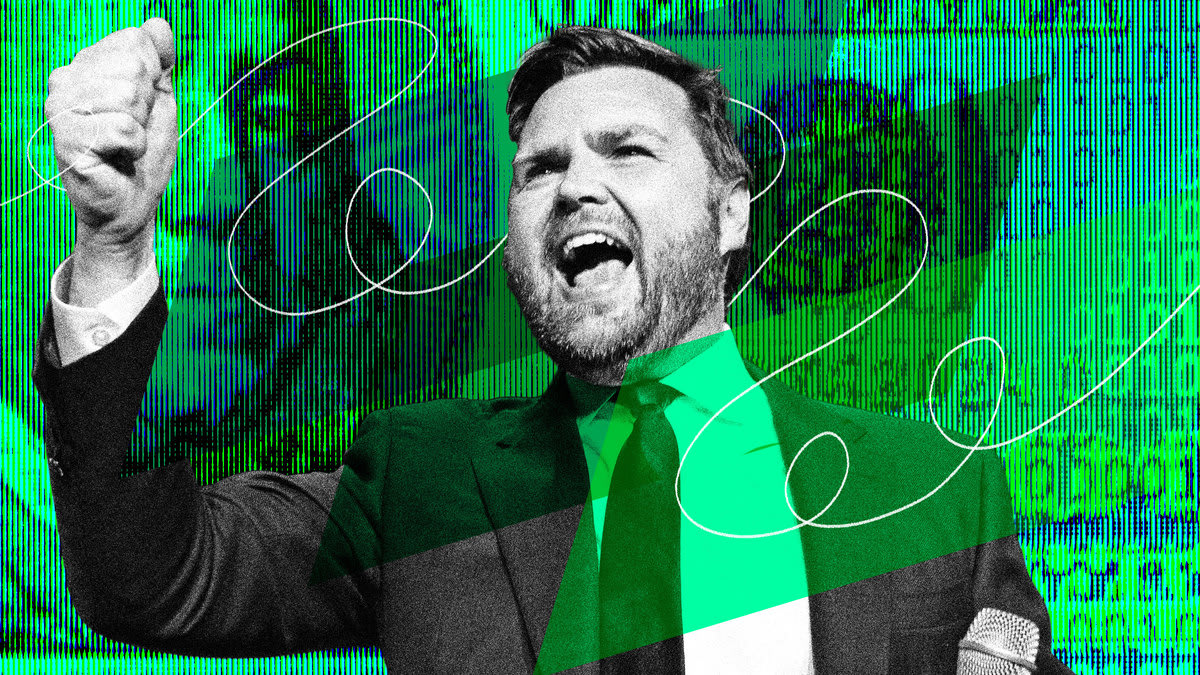Pay Dirt is a weekly foray into the pigpen of political funding. Subscribe here to get it in your inbox every Thursday.
According to a new legal complaint, investment banker J.D. Vance knowingly received unlawful support from a super PAC funded by his friend and billionaire backer, Peter Thiel.
The complaint, which watchdog groups Campaign Legal Center and End Citizens United filed with the Federal Election Commission on Monday and shared exclusively with The Daily Beast, alleges that the Vance campaign and the Protect Ohio Values super PAC coordinated for months through a secret website, where the PAC posted hundreds of pages of valuable information—including strategic assessments, messaging proposals, opposition research, video footage, internal polling data, and even a draft script the campaign adopted in for a late-game ad.
The deal was mutual, according to the filing, pointing to pages of evidence that the Vance campaign accepted and used the material to the candidate’s benefit, helping him land ex-President Donald Trump’s endorsement and leapfrog past competitors he had trailed for months.
Federal law prohibits coordination between campaigns and super PACs. And the watchdogs lay out a remarkably brazen scheme that spanned several months, accusing the groups of unlawful coordination, reporting violations, and impermissible in-kind donations with a value in the millions of dollars.
“This abuse is perhaps one of the clearest and most flagrant examples of a candidate and a super PAC skirting campaign finance laws,” End Citizens United president Tiffany Muller said in a statement. “Protect Ohio Values PAC and JD Vance’s campaign completely disregarded the law as the super PAC essentially served as an all-inclusive and paid-for arm of the campaign. Wealthy donors danced around the law to prop up their preferred candidate, who will inevitably be indebted to them. People in Ohio—or anywhere else—don’t want billionaires buying elections, and are fed up with it. The FEC should immediately investigate this matter and hold all parties accountable.”
Saurav Ghosh, director of federal reform at CLC and a former enforcement attorney at the FEC, said that the arrangement exemplifies “inequity and corruption in our elections.”
Want a closer look inside the pockets of the government’s most powerful players? Subscribe to the Pay Dirt newsletter here for exclusive reporting every Thursday.
“The power of wealthy special interest money in our politics threatens our First Amendment right to have our voices heard. When candidates and campaigns flout federal campaign finance laws, they are fostering a system that elevates the voices of the rich and drowns out the voices of everyday Americans—increasing the risk of corruption,” Ghosh said in a statement. “The FEC, which is responsible for enforcing campaign finance laws, should protect American voters against inequity and corruption in our elections.”
Super PACs, which can raise unlimited amounts of money, including from corporations, have a literally infinite financial advantage over campaigns. And while campaigns and super PACs have tried a number of inventive ways to sidestep coordination laws over the years, the extent of the Vance arrangement—even if ultimately found to be within the law—is unheard of.
An immense amount of work went into maintaining the Protect Ohio Values website, which was hosted on the Medium blogging platform and is still accessible as of this writing. But even though it was home to reams of valuable data and highly detailed reports in the form of more than 20 personable posts, the site was kept from the general public for months, revealed only in a Politico report on May 3—the day of the primary election.
By contrast, the official Protect Ohio Values website consists of a single bare-bones homepage featuring two substantive sentences.
The 94-page complaint offers evidence indicating the super PAC designed the Medium website to be undiscoverable. It didn’t show up in a number of Google keyword combinations, for example—even including the word “Medium.” And when Politico published a sensitive internal poll in February, Protect Ohio Values leadership was reportedly stunned; they suspected the site’s servers had been breached, and even tried to smoke out an internal “leaker,” according to Politico.
“In other words, before it was identified in the Politico article, the trove of information that Protect Ohio Values posted on Medium.com was essentially hidden from public view, even if someone knew exactly what to search for,” the complaint says, noting that it’s unclear how the Vance campaign could have known about the website without a tip from Protect Ohio Values.
Turns out there was no leaker. A rival campaign accidentally unearthed the site several months before the election, according to the staffer who happened across the page. The staffer told The Daily Beast the discovery was a pure stroke of luck, the result of one of countless late-night Google deep-dives. But the campaign kept the secret a secret, and monitored the information surreptitiously as it was posted.
“While I have seen sites like these, both Democratic and Republican, where campaigns and super PACs make information public, the sheer amount of information shared on this site was absolutely unprecedented,” the staffer said.
“Access to this detailed information (polling, opposition research, even proposed ad scripts) likely saved the campaign over a million dollars of spending and clearly attempted to help dictate and coordinate the messaging of the campaign and Protect Ohio Values,” added the staffer, who had not seen the complaint.
The complaint trots out troves of evidence to suggest the coordination between groups was knowing and willful, including, ironically, multiple posts on the site itself.
The most egregious example is an Oct. 4 post where the super PAC openly admits it planned to share information with the campaign through a common vendor, DeepRoot.
The complaint also highlights the super PAC’s recommendation that Vance focus on immigration issues to win Trump’s endorsement. The advice included a draft script, which, according to the legal filing, the campaign later appeared to draw heavily from in an advertisement.
As evidence of this coordination, the complaint points out several instances where the campaign seemed to take messaging advice straight from the super PAC’s post:
- Script: “I was raised by my grandparents because my mother got addicted to opioids.”
- Ad: “I nearly lost my mother to the poison coming across our border.”
- Script: “This is personal to me.”
- Ad: “This issue is personal.”
- Script: “No kid should have to grow up without a mother.”
- Ad: “No child should grow up an orphan.”
Three days after Protect Ohio Values suggested in a Feb. 17 post that Vance announce he would “declare the drug cartels terrorist organizations,” Vance said in two interviews and a tweet from his official campaign account that “[w]e need to declare the Mexican drug cartels terrorist organizations.”
Trump endorsed Vance 10 days after the campaign launched the anti-immigration ad.
Thiel, a billionaire tech mogul who has funded Vance’s investment firm, has reportedly met with Trump multiple times on Vance’s behalf, including around the time the PAC proposed a pivot to immigration. In all, Vance’s business partner and mentor contributed more than $13 million to the group—nearly its entire bankroll—including $10 million in seed money about four months before Vance officially launched his campaign.
Over the course of the campaign, the super PAC spent more than $7.5 million in direct support of Vance, along with other expenses totaling more than $620,000 for data management, $750,000 for polling, and $600,000 in consulting fees.
The Vance campaign and Protect Ohio Values didn’t immediately respond to a request for comment.
Subscribe to the Pay Dirt newsletter here to follow the movement of the dirty dollars influencing our public policy.

